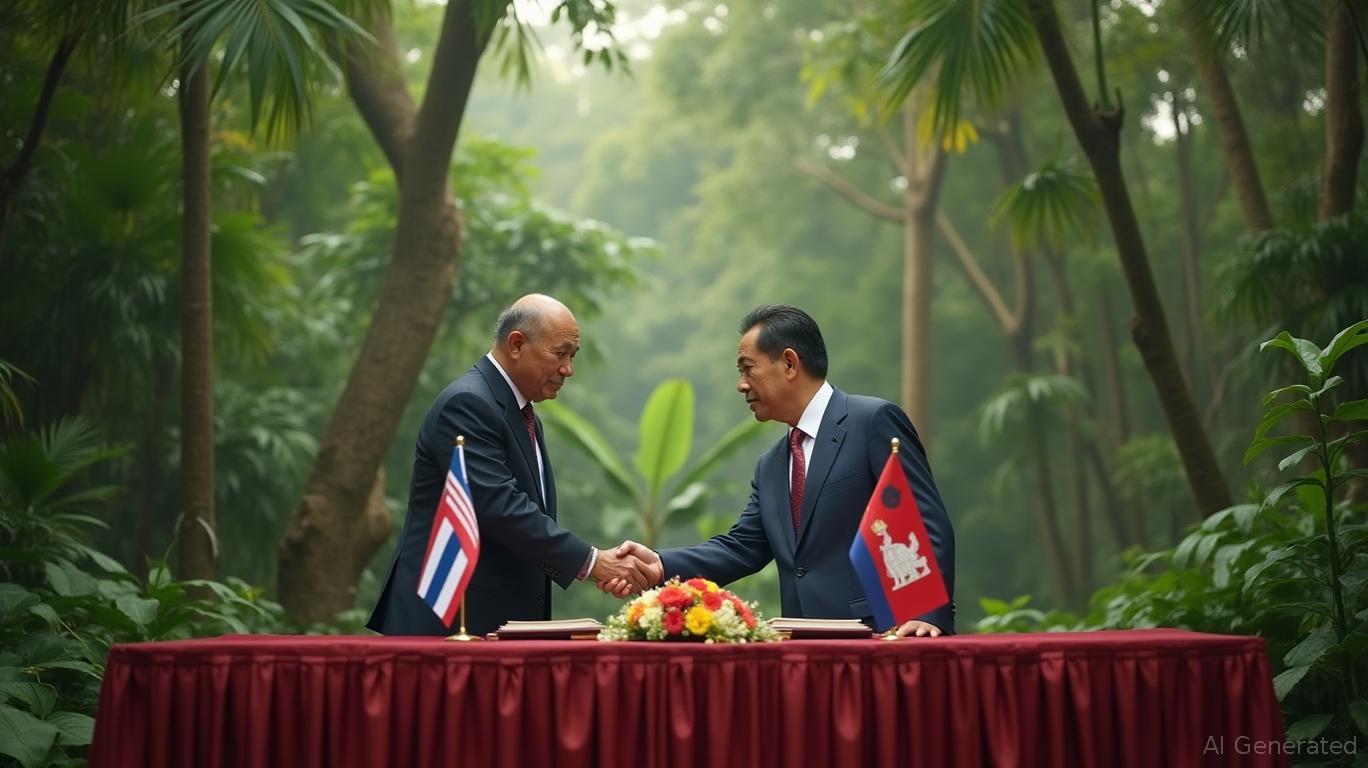U.S.-Supported Thailand-Cambodia Accord: A Strategic Geopolitical Maneuver for Stability in Southeast Asia
- Thailand and Cambodia near historic peace deal, backed by U.S., to end border clashes with weapon withdrawals and joint de-mining. - U.S. involvement highlights regional influence amid China’s growing presence, with Trump set to witness the October 25 signing. - Thailand unveils $150M tourism stimulus to boost domestic travel, balancing fiscal prudence with growth targets. - China-U.S. trade talks in Malaysia aim to ease tensions over tariffs, with both sides addressing trade barriers and rare-earth expo
Thailand and Cambodia are close to reaching a landmark peace deal aimed at ending months of violent border disputes, with U.S. President Donald Trump expected to attend the signing ceremony during the ASEAN summit in Kuala Lumpur. Thai Defense Minister Natthaphon Narkphanit noted that the negotiations have made "substantial headway," as both countries have agreed to pull back heavy weaponry from contested areas, begin collaborative landmine clearance, and form a joint task force to combat cybercrime. The agreement, anticipated to be formalized on October 25, represents a major advance for stability in Southeast Asia, a region long challenged by territorial conflicts and political friction, according to
This accord unfolds against a backdrop of shifting geopolitics, with the U.S. aiming to bolster its regional role as China’s influence expands. American mediation in the July ceasefire and the participation of U.S. observers in ongoing discussions highlight the deal’s strategic weight. Cambodia’s Deputy Prime Minister Tea Seiha stressed the importance of "reciprocal trust and assurance" throughout the talks, which also involve the release of 18 Cambodian soldiers held in detention,

Separately, Thailand’s tourism industry is poised to benefit from a 150 million dollar stimulus initiative designed to encourage local travel and aid economic revival. The government has introduced tax breaks for both individuals and companies, with special incentives for visiting less-traveled provinces and organizing business events. Finance Permanent Secretary Lavaron Sangsnit explained that these policies are intended to spur spending before the peak tourism season, potentially boosting GDP growth by 0.04%. However, the plan is expected to reduce tax income by about 5 billion baht, illustrating the challenge of balancing fiscal responsibility with economic support, as reported by
At the same time, American and Chinese representatives are preparing for trade discussions in Malaysia, aiming to ease tensions heightened by Trump’s recent tariff threats on Chinese imports. The Chinese delegation, led by Vice Premier He Lifeng, will address topics such as rare-earth exports and trade restrictions,
The intersection of these events underscores the shifting economic and political environment in Southeast Asia. Thailand’s internal reforms and diplomatic initiatives are in step with broader U.S. and Chinese efforts to influence trade and security in the region. As ASEAN leaders convene in Kuala Lumpur, the outcomes of the Thailand-Cambodia peace agreement and the China-U.S. trade talks may set important examples for future regional cooperation amid intensifying strategic rivalry.
Disclaimer: The content of this article solely reflects the author's opinion and does not represent the platform in any capacity. This article is not intended to serve as a reference for making investment decisions.
You may also like
Private Capital Soars to $22 Trillion: Progress or Potential Threat?
- Private capital markets now exceed $22 trillion, rivaling global economies as companies delay public listings and favor private funding for flexibility and cost savings. - Private equity outperforms public markets by 6% annually, while opaque lending practices in $1.7 trillion private credit raise risks highlighted by Moody's and Capital Economics. - Rapid private credit growth (20% annual U.S. expansion since 2010) faces scrutiny over hidden leverage, with JPMorgan's Dimon warning of systemic "cockroach

A Name Shaped by Tomorrow: Celebrating 25 Years of Accenture’s Pioneering Innovation
- Accenture's 1998 rebranding from Andersen Consulting involved 51 vetted names, selected through global research and linguistic checks across 65 languages. - The name "Accenture" (combining "AC" and "future") emphasized innovation, chosen by 2,500 partners to signal technological leadership and client-centric solutions. - Over 25 years, Accenture expanded AI capabilities via 2025's Decho acquisition and partnerships like Mondelez's AI-driven marketing tool, reducing content costs by 30-50%. - With $160B m

"US-China Trade Agreement Prevents Tariff Conflict, Ensures Continued Supply of Rare Earths"
- U.S.-China trade talks in Malaysia avert Trump's 100% tariffs and China's rare earth export curbs, stabilizing global tech/defense supply chains. - Framework includes fentanyl controls, potential soybean purchases, and defers May 2024 truce expiration to November 10, with possible extensions. - Unresolved issues include China's 58% fulfillment of 2020 trade pact commitments and U.S. reliance on Chinese rare earths despite diversification efforts. - Trump-Xi in-person meetings ahead of G20 will finalize t

China and U.S. Reach Tentative Agreement in Trade Negotiations as Tariff Deadline Approaches
